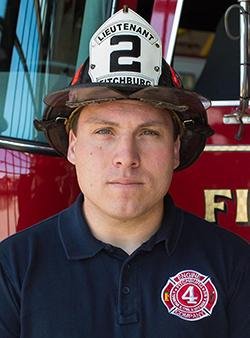Occupational Cancer in the Fire Service
Firefighters have much higher rates of cancer than the residents they serve.
This is due to carcinogen exposure:
on the fireground. Especially in fires where plastics and synthetics release harmful gases;
and in the firehouse from diesel exhaust and residual soot.
Firefighters can unknowingly pass carcinogens on to their fellow firefighters and loved ones.
Yet, cancer in firefighters is not inevitable. There are protective actions that all ranks of the fire service can take to decrease the risk of cancer. These include increasing awareness, early detection and enhancing protection. The Massachusetts Fire Academy (MFA) offers cancer awareness programs and early detection cancer screenings.
Success Stories
“When I was asked to join the cancer awareness team at the Department of Fire Services (DFS), I was excited to spread the word about the most dangerous under-recognized threat to firefighters - cancer!
My father was a Fitchburg firefighter. He passed away at age 62 from occupational cancer. His death motivated me to spread the word about early cancer detection and prevention to as many firefighters as I could reach…”
“The early detection programs offered by DFS are an asset to the fire service if people take advantage of them. I encouraged all my members to take part.”
Saving Lives with Early Detection - One Firefighter's Story
In this video, FF Joanie Cullinan (Wellesley Fire Department) and Dr. Christine Kannler talk about a free skin cancer screening that saved FF Cullinan's life.
NEWS
Why Wildfire Fighters Are Getting Dangerously Sick
The U.S. Forest Service has been sending out crews to fight fires without the recommended masks for decades. Hannah Dreier, a New York Times investigative reporter, reveals the dangerous and sometimes deadly repercussions of sending firefighters into the field unprotected.
Firefighter Cancer: The Massachusetts Experience
BY CHRISTINE KANNLER, MD
My younger brother, Peter, was a firefighter in Chelsea, MA, an instructor in the Massachusetts Firefighting Academy (MFA) burn building and a hazmat technician. He was selected to be trained as an instructor to teach the Firefighter Cancer Support Network (FCSN) course “Taking Action Against Cancer in the Fire Service.” The MFA was starting an initiative to educate and to try to reduce the incidence of cancer.
The Overlooked Role of Environmental and Occupational Exposures in Cancer Prevention and Screening
BY CHRISTINE KANNLER, MD, COMMITTEE ON ENVIRONMENTAL AND OCCUPATIONAL HEALTH MEMBER
"Don't waste my cancer" — Dr. Christine Kannler shares her motivations to advocate for occupational health screenings in this short video.
The US Preventive Services Task Force (USPSTF) aims to provide screening recommendations that help physicians enhance health outcomes and reduce cancer risk. Physicians utilize these guidelines daily to educate, screen, and treat their patients. For example, the USPSTF recommends screening patients for obesity, tobacco usage, and alcohol consumption — factors strongly linked to poor health outcomes.
Contact
Feel free to contact us with any questions.
Email
Abby Baker - abby.baker@mass.gov
Phone
(978) 567-3205 Monday - Friday, 7 a.m. - 3:00 p.m.
Fax
(978) 567-3229




